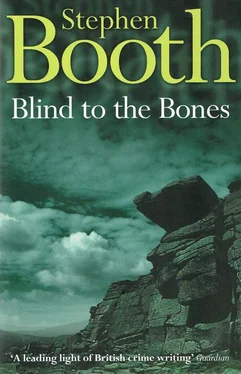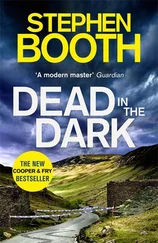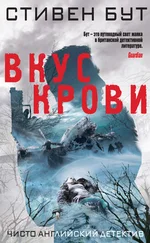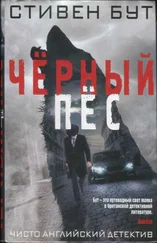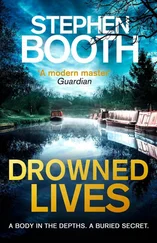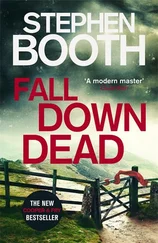‘If you feel the need for a break at any time, just say so, and we’ll stop the interview.’
‘You’re very considerate.’
Fry looked a bit surprised to be regarded as considerate. She was only doing what the PACE rules told her to. She was doing it by the book.
‘You’ve kindly given us a statement about the circumstances surrounding your discovery of human remains in the churchyard of St Asaph’s, Withens,’ she said. ‘This is the church where you are the incumbent.’
She had to read the word ‘incumbent’ from Derek Alton’s statement. It wasn’t a job title that she was familiar with.
‘I’m priest in charge of Hey Bridge and Withens,’ said Alton.
‘So you’re the incumbent at Withens?’ said Fry, unsure whether he was contradicting himself.
‘That’s right.’
‘You’ve said in your statement that there wasn’t anything particular that made you choose that part of the churchyard to clear.’
‘Well, only because of the graves there. They’re very small memorial stones. They were disappearing completely.’
‘When was it last cleared?’
‘I really don’t know,’ said Alton. ‘It was already deteriorating when I came to Withens.’
‘Have you noticed any disturbance in that particular area?’
‘Well, not really.’
‘Not really? Was there something?’
‘There’s litter left. Beer cans, that sort of thing. Sometimes you can tell people have been in that part of the churchyard at night — branches broken off the trees, ground trampled. Once or twice, somebody has tried to start a fire.’
‘It’s out of sight from the road, isn’t it?’
‘Yes, indeed. That’s the problem.’
‘Mr Alton, do you know who comes into the churchyard at night?’
Alton looked a little more nervous.
‘Children? Teenagers?’ said Fry.
‘Yes, I think so. Usually. But I can’t imagine they would do anything like this...’
‘Any particular youngsters you might be able to identify?’
Alton grimaced. ‘Of course. The Oxleys.’
‘Thank you, sir. DC Cooper will make sure you get back home to Withens.’
Ben Cooper had noticed Tracy Udall’s Astra in the car park at West Street, and guessed she must have been summoned to a divisional meeting that had been taking place upstairs. When he found her, she was in the locker room, cleaning her rigid handcuffs, oiling the boss and ratchet bar with WD40.
‘Cholera?’ said Cooper.
His dictionary defined cholera as an acute communicable bacterial infection of the small intestine by vibrio cholerae , derived from the ingestion of food or water contaminated by human sewage containing the micro-organism. It said the symptoms included the rapid onset of a profuse, white, watery diarrhoea, with muscle cramps, vomiting and progressive fluid loss, resulting in death within a few hours.
Cooper had very soon started feeling unwell.
‘I mean, cholera ?’
‘It was a result of the conditions the navvies lived in,’ said Udall. ‘You know, the shanty town?’
‘Yes.’
‘They not only had poor food and no health-and-safety regulations, they also weren’t provided with any clean water or any toilet facilities. Their food and water got contaminated by human sewage, and men started dying of cholera by the dozen. Some are buried at Woodhead Chapel, above the A628.’
‘But others are buried in the churchyard at Withens.’
‘That’s right. It’s ironic, when you think about it. Well dressing is supposed to have started after the Black Death. The villages that escaped being affected by the plague credited the purity of their local water supply for protecting them. So they revived the tradition of blessing the wells as a way of saying thank you. I think Tissington was one of the first.’
‘Some of them probably still believed they were propitiating the water goddess in those days,’ said Cooper.
But Udall was right. Those Derbyshire villagers did have good reason to be thankful. In the middle of the fourteenth century, Black Death had killed a third of the population of England. Villages like Tissington were very lucky not to have been touched. Five hundred years later, though, it had been cholera that had taken the lives of the navvies building the Woodhead tunnels and living in their pitiful shanty towns.
‘So the other well in Withens is avoided because it’s on the wrong side of the churchyard — below it, where the cholera from the bodies buried there could get into the water supply?’
‘It’s nonsense, of course.’
‘But you understand how that fear might have arisen. Those men died from drinking contaminated water in the first place.’
Udall dried the handcuff grip and reset the handcuffs to preload.
‘You know, a lot of people use the tip of a ballpoint pen to double-lock their cuffs,’ she said. ‘I always think that looks a bit unprofessional — it gives the impression you’ve lost the key and you’re trying to pick the lock with a pen.’
‘Some people do lose the key,’ said Cooper. ‘Or forget to take one with them.’
Udall sniffed. ‘Some people seem to want trouble. They go in as if they want a suspect to turn violent. Not me. These handcuffs are the most important bit of equipment I have, and learning touch ’n’cuff has been a godsend. It’s saved me a lot of trouble from arrests over the last few years. I’ll be happy if I never have to draw a baton. A lot of my arrests don’t know what’s happening. The first time I touch them, they’re under my control. Then I tell them they’re under arrest. And they come like lambs, by and large.’
She eased the handcuffs back into their pouch and patted it, almost with affection.
‘Do you think it helps being female?’ said Cooper. He had seen plenty of male officers who had exactly the attitude that Udall had described. When they went in to a situation, it was as if they wanted trouble, either because it made them feel macho, or because they liked the adrenalin rush from the risk of injury, he wasn’t sure.
‘Oh yes,’ said Udall. ‘They take one look at me, and they’re lulled into a false sense of security. They don’t realize how dangerous I am.’
‘Want to come and give the Reverend Derek Alton a lift back to Withens?’
‘Why not?’
Derek Alton didn’t seem to want to talk on the way home. He sat in the car staring out of the window at the passing scenery as they descended into Longdendale.
‘Will you be blessing the well dressing this weekend?’ said Ben Cooper.
‘Yes, of course.’
‘I always thought well dressings were pagan. Water worship. But the church has taken them over these days, hasn’t it?’
‘The Church of England is nothing if not pragmatic,’ said Alton. ‘The early missionaries were told not to destroy the pagan holy places and beliefs but to incorporate them into the new religion. The spring festival of the fertility goddess Oestre became the date of the resurrection. They still name it Easter, which I always think is a bit of a giveaway, myself. And death and resurrection have symbolized the beginning of spring for thousands of years. Winter and spring, death and life, the dark and the light. The natural cycle.’
‘Like the mummers’ play tradition. The Fool is killed, then brought back to life again.’
‘Of course. It’s a resurrection play.’
‘Except they didn’t save a part for Jesus.’
Alton decided not to take the bait. He went back to the scenery as they approached the road over the reservoirs.
‘And you’re interested in the Border Rats,’ said Cooper.
‘They’re based on Border morris, which was the real workingmen’s tradition. It was a way of getting a bit of money during the winter, when their families might have starved otherwise. Since begging was illegal, they blacked their faces up as a disguise. But in Withens, the tradition has developed in its own way. That’s the nature of genuine traditions. They’re not preserved in aspic, they develop naturally and mean whatever people want them to mean.’
Читать дальше
Конец ознакомительного отрывка
Купить книгу
